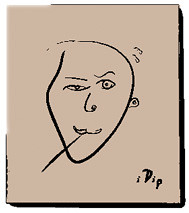A Nobel for Sistani
Published: March 20, 2005 (Source: NY Times)

As we approach the season of the Nobel Peace Prize, I would like to nominate the spiritual leader of Iraq's Shiites, Grand Ayatollah Ali al-Sistani, for this year's medal. I'm serious.
If there is a decent outcome in Iraq, President Bush will deserve, and receive, real credit for creating the conditions for democratization there, by daring to topple Saddam Hussein. But we tend to talk about Iraq as if it is all about us and what we do. If some kind of democracy takes root there, it will also be due in large measure to the instincts and directives of the dominant Iraqi Shiite communal leader, Ayatollah Sistani. It was Mr. Sistani who insisted that there had to be a direct national election in Iraq, rejecting the original goofy U.S. proposal for regional caucuses. It was Mr. Sistani who insisted that the elections not be postponed in the face of the Baathist-fascist insurgency. And it was Mr. Sistani who ordered Shiites not to retaliate for the Sunni Baathist and jihadist attempts to drag them into a civil war by attacking Shiite mosques and massacring Shiite civilians.
In many ways, Mr. Sistani has played the role for President George W. Bush that Nelson Mandela and Mikhail Gorbachev played for his father, President George H. W. Bush. It was Mr. Mandela's instincts and leadership - in keeping the transition to black rule in South Africa nonviolent - that helped the Bush I administration and its allies bring that process in for a soft landing. And it was Mr. Gorbachev's insistence that the dismantling of the Soviet Empire, and particularly East Germany, be nonviolent that brought the Soviet Union in for a soft landing. In international relations, as in sports, it is often better to be lucky than good. And having the luck to have history deal you a Mandela, a Gorbachev or a Sistani as your partner at a key historical juncture - as opposed to a Yasir Arafat or a Robert Mugabe - can make all the difference between U.S. policy looking brilliant and U.S. policy looking futile.
Mr. Sistani has also contributed three critical elements to the democracy movement in the wider Arab world. First, he built his legitimacy around not just his religious-scholarly credentials but around a politics focused on developing Iraq for Iraqis. To put it another way, says the Middle East expert Stephen P. Cohen, "Sistani did not build his politics on negating someone else." Saddam Hussein built his politics around negating America, Iran and Israel. Arafat built his whole life around negating Zionism - rarely, if ever, speaking about Palestinian economic development or education. The politics of negation has a deep and rich history in the Middle East, because so many leaders there are illegitimate and need to negate someone to justify their rule. What Mr. Sistani, the late Lebanese Sunni leader Rafik Hariri and the new Palestinian President Mahmoud Abbas all have in common is that they rose to power by focusing on a positive agenda for their own people, not negating another.
The second thing that Mr. Sistani did was put the people and their aspirations at the center of Iraqi politics, not some narrow elite or self-appointed clergy (see: Iran), which is what the Iraqi election was all about. In doing so he has helped to legitimize "people power" in a region where it was unheard of. In Lebanon, Egypt and Palestine - where Hamas recently said it would take part in parliamentary elections - the ballot box and popular support, not just the gun, are showing signs of becoming real sources of legitimacy. Both Hezbollah and Hamas will have to prove - with turnout, not terrorism - that they are entitled to a larger slice of power.
Third, and maybe most important, Mr. Sistani brings to Arab politics a legitimate, pragmatic interpretation of Islam, one that says Islam should inform politics and the constitution, but clerics should not rule.
The process of democratizing the Arab world is going to be long and bumpy. But the chances for success are immeasurably improved when we have partners from within the region who are legitimate, but have progressive instincts. That is Mr. Sistani. Lady Luck has shined on us by keeping alive this 75-year-old ayatollah, who resides in a small house in a narrow alley in Najaf and almost never goes out the door. How someone with his instincts and wisdom could have emerged from the train wreck that was Saddam Hussein's Iraq, I will never know. All I have to say is: May he live to be 120 - and give that man a Nobel Prize.
---------------------------------

No comments:
Post a Comment